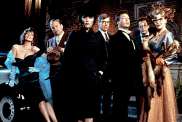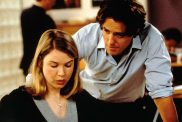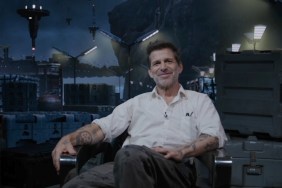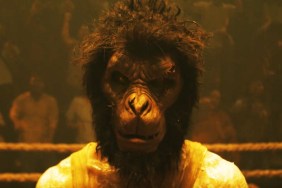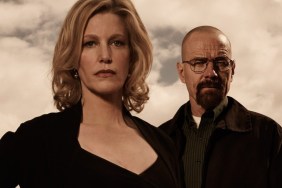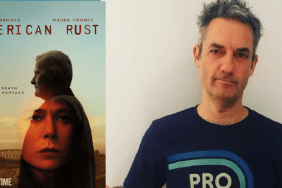More than anything, the real core to whether The Change-Up will work or not comes down to the relationship between the characters played by Ryan Reynolds and Jason Bateman, and we got a really good idea how that might work when we sat down with the two actors and learned that they really have a strong chemistry that isn’t just acting.
Q: With the kinds of movies you’ve been doing before this, is this a fun break to do a hard R film. Why did you choose this particular film?
Ryan Reynolds: Well I wanted to work with Jason. And the script I read when I was shooting another film that was very difficult to shoot. I remember reading it and sitting in bed and crying laughing.
Bateman: You read this during “Buried”?
Reynolds: Yeah, and crying laughing. “I’ve got to do this somehow, or just get it on a loop in my house if someone else does it.” I really, really was attracted to it, and it came through on all levels. You get scared if you’re working on a movie that you have a really good time on, because you think how can this be good if I’m having so much fun? It’s been that from day one. Since our first day of rehearsals throwing the football around in that hall, it’s just the greatest job for me that I’ve done in a long time. It’s just what I needed. It’s like a vacation, but creative.
Bateman: It really is the combination of a lot of great elements, both on the page and on the set.
Q: Did you guys both come onto the project at the same time?
Reynolds: Nobody’s ever really doing a movie until you break for lunch the first day, and then it’s iffy.
Bateman: The elements were floating around for a long time, and people smarter and richer than us have to decide when it all can come together. There’s somebody stirring that big pot. There’s a friendship that’s been there, and there was certainly a mutual desire to want to commit. We’re lucky, really lucky that we got to do, like you said, this particular film together. I think the first time I saw you, when it kind of became pretty clear, was it the Oscars?
Reynolds: Yeah.
Bateman: That thing, you see an old friend across the room– are we going to do this? It’s been that great since.
Q: Neal Moritz doesn’t do a lot of comedies. Has he been very hands-on?
Bateman: Listen, this guy is one of the – are there 12 vertebrae? He’s one of the 12 in the town that makes things happen, so we’re lucky to have him part of this thing.
Reynolds: He works really, really hard. I’ve never seen him blink.
Bateman: Titanium eyeballs.
Q: Since we haven’t actually seen you guys changing place yet, are you “doing” each other when you change
?
Bateman: It’s not that. I told Dobkin early that my talents and skill set does not include doing impersonations, I’m just not that talented. If your plan for this film is to do basically, Ryan’s going to do his version of a ne’er do well, I’m going to do my version of a conservative guy, and vice versa, then I think I can maybe
Reynolds: It’s also the most fun that way. We get to have the most fun, be the most free that way. There are certain elements that we definitely carry over from before, dialogue and physicality, but we’re not doing spot-on impressions of each other. We don’t want the audience to start to go, “He didn’t do the perfect slowburn with the patented signature Bateman eyebrow raise!” Which is a very tough move to pull off.
Q: Did you study each other beforehand?
Reynolds: We’ve known each other for a long time, but we didn’t do too much of that.
Bateman: We’ve been mutually complimentary for a bunch of years. I initially fell in love with Ryan
Reynolds: This is our eHarmony ad.
Bateman: …at the “Van Wilder” premiere, and watched his stuff ever since.
Reynolds: We’ve been trying to do something together for a long time. We’ve come real close to working together on a couple of things, and I’m glad those didn’t work out because we might not be sitting here right now.
Q: How many scenes do you get to perform together? I get the sense there’s a chunk of the film where you’re each on your own path.
Reynolds: It’s a bit of both.
Bateman: It’s an interesting construction they did, because you’d think that, but somehow they manage us to pretty much check in with one another. There are some phone calls. But we do organically end up in the same place a lot.
Reynolds: And we’re the only ones who know what’s happening. Otherwise it would be very episodic, each go off – this happens, then this happens. It’s the two of them really trying to control the other’s situations. I need you to do this properly, or I’m screwed when we switch back. And it works both ways. Most of it is motivated by something.

Q: Can you talk about the level of humor in the film? We’ve heard it’s a very hard R.
Reynolds: I hope it’s R. I’m thinking maybe NC-17 at this point.
Bateman: There’s stuff there that we could probably push it. I don’t know if it was Lucas and Moore’s intention, but there has been a few PG and PG-13 versions of the body-swapping movie. We’ve all seen them and they’ve been great. They’ve done a fresh version of that by making it R. It’s a great, simple, easily relatable concept made fresh by throwing the whole fish out of water conceit into deeper and rougher waters.
Reynolds: I don’t think there’s any point in making it any other way. The R rating is the reason that I’m here. You do all the things you wish you could have seen in those other movies. Also seeing these two guys, in their own way, take advantage of the situation. It’s a hall pass. You get a day pass here, and what would you do with it? There’s a lot of things that happen both nefarious and fun, and they’re both kind of the same actually, that you couldn’t do in a PG-13.
Bateman: And they’re really doing a great job by putting us in as risqué and gratuitous situations as possible, but having the characters be charmingly underwater. Most of the time they’re not driving these unseemly situations, they’re a victim of them. It becomes a bit more palatable and doesn’t seem like we’re really pandering for, “Oh, it’s a hard, edgy R laugh there!” If that happened to you, you’d say “F*ck!” as opposed to “Darnit.” And “f*ck” is going to get you an R and “darnit” doesn’t. We’re not forcing it.
Q: We hear that about a third of the way through the movie, and [to Bateman] you get on the f*ck train, you go crazy…
Bateman: That’s a possible title.
Reynolds: Yeah, f*ck train. That’s the Bulgarian release.
Q: Just in time for Christmas. Was that part of the appeal? When you started reading the script, it seems like you’re supposed to be a straight shooter, and then it flips.
Bateman: Yeah, I think for both of us, it’s an actor’s dream. It’s Jekyll and Hyde, you get to play both sides of it. We both spent time playing this guy, but when you play this guy and switch back and do the other guy and vice versa, it kind of allows you to spread out your bookends a little bit more, the borders, the goal posts. It’s a great challenge comedically.
Reynolds: And when we first started talking about the film, we both put our hands up into the air as to which role we wanted to play. I was easy either way, you were easy either way. “I don’t know, I’ll play Dave for the bulk of the movie I guess. I’ll play Mitch. Ok, great!”
Bateman: And during rehearsal we swapped quite a bit.
Reynolds: Just to see what it would sound like.
Bateman: A research thing, you know.
Reynolds: And as a way to shame me.
Q: And your characters are best friends for how long in the movie?
Reynolds: We’ve been friends since I was in school. In this scene we’re about to do we talk about how we had the same social studies teacher in school, but we’re friends that have drifted apart too. There’s quite a polarization at work. I’ve never grown up, really, or achieved anything remotely resembling responsibility, and he’s missed out on a lot of his life. Our logline is about integration. These two guys, if you could just combine them they’d be one great person, but that’s the idea, that they’ve been friends forever but sort of drifted apart. They’re too different now to really spend a lot of time together. I’m trying to reconnect with him at the beginning of the movie.
Q: I get the sense that there are no real effects in the movie. It’s entirely up to you guys to sell the switch.
Bateman: Yeah, yeah yeah. There’s no PG me looking like him or him looking like me.
Q: Or the voice or anything?
Reynolds: No, it’s old-fashioned in that sense. It’s a real 80s premise, it’s just executed in a different way than we’ve ever seen it before. We’re not doing anything new in terms of that stuff. You go along with the conceit at the beginning, that’s the hope.
Bateman: We’re assuming, we’re hoping, based on the material and the concept they’re going to go, “These guys are going to switch bodies.” So let’s have them just piss in a magic fountain and we’ll be done with it. Who cares? It’s what happens after that that we have to earn, and Lucas and Moore did a great job with it.
Q: So it’s not like “Big” where you’re trying to find the magical thing to change you back?
Reynolds: Well it’s a wish-fulfillment thing, it just turns out to be the worst wish ever. There is a question of that for sure. These guys are exposed to things they’re not comfortable with. It’s not a joyride. That’s the whole point.

Q: Are your characters aware of body-switching movies? Like, does that exist in their world?
Reynolds: No, this isn’t a regular occurrence in our little town. We have to handle it as if it’s the most preposterous thing that ever happened. That’s the hardest scene in the movie, where we have to process that.
Bateman: That’s a tricky little thing to navigate. If you’re saying we have to base this in reality as much as possible so the absurdity can pop, then you have to give due time to the lightbulb going off that, oh my God, I woke up in another guy’s body. But that’s all Lucas and Moore. The smart guys did that before we got there, and we just have to play those scenes with conviction.
Q: How do you do R-rated humor when there are kids on the set? Obviously the kids are part of it.
Reynolds: Well the child abuse has already started. It’s showbiz. All I’m really doing is helping I think at this point. No matter what I do, they’re going to leave better people.
Q: So the little girl won’t be scarred for life by what you’re saying to her?
Reynolds: Yeah, probably. She’s not listening to me. She’s waiting for her cue line, which keeps changing. Poor little girl. I really threw my back out tossing her around.
Q: Yeah, you threw her really high.
Reynolds: That’s the idea. They actually had wires here today to assist in that, but we didn’t end up using them. That’s why the stunt guys are here. They were going to wire her so I could throw her dangerously high in the air, spin her around and catch her in weird ways. But I just thought that was a great way for me to break my nose.
Bateman: It’s a stretch, but it’s almost a good example of the R vs. PG version. In the PG version he’d throw her up, turn to Leslie and say three lines, and then the kid would come back down. The R joke is actually having the frame wide enough that you actually see how f*cking scary
Reynolds: And the idea is to plant in the minds of the viewers that this person should never be left alone with this child, which of course happens later. Way too much exposure to Mitch.
Q: We saw you guys shooting a bunch of different alternate takes so do you do that a lot with the script?
Reynolds: We spent a few weeks throwing a football around in a big hall out here, before shooting– quite literally– just coming up with alts and making each other laugh. We wrote them all down, and some of them happen, we put them in the script–it actually says “alt”–just so we’ll remember it. And others happen when they’re here. You see that look of innocence in that little girl’s eyes and you say, “I need to push her into the stairs. I need to quiet that innocence.”
Bateman: You actually warrant a bit of a writing credit. You should get at least a cast bump.
Reynolds: I don’t think the Writer’s Guild works that way. Jason and I both, I wish he could be up by the monitor when he’s not working. The thing that he and I both love doing is throwing out alts and jokes while sitting behind the monitor.
Bateman: I owe you a dozen.
Reynolds: Yeah, I owe you. You actually do owe me, because you always come up with them after I’ve finished the f*cking scene.
Q: Was there any part of the script you were uncomfortable with initially?
Reynolds: I don’t have that button. I don’t have that thing. I don’t possess it.
Bateman: That’s a good question. Was there anything?
Reynolds: There were a few things that we both really had to talk about, in a healthy way.
Bateman: Yeah, execution-wise. Like we were talking about earlier, there are some graphic, raunchy f*cking things in this movie, and if it’s not executed in a tasteful, semi-sophisticated way, it just becomes poor taste. And hopefully we’re on the side of that. And that’s a combination of multiple departments – the camera, the writing, the music, the editing. There’s a thousand ways to shoot every joke, and a bunch of ways to perform them. It has to be a proper cocktail. I don’t mean to make this sound like highbrow science, but it takes a conversation between all the creatives.
Q: Was there a specific instance where you thought, “Execution is everything here”?
Reynolds: A lot of the setpieces in the film are kind of that.
Bateman: There’s more than one. It’s a bit of a minefield in this sense.
Reynolds: The big comedy pieces have to be played with utter reality, because otherwise you’re watching “Airplane!”
Bateman: You talk to Dave (Dobkin), and he says this much more eloquently but I’m paraphrasing what he said. He loves scripts that have big broad, relatable set pieces but they’re executed in a sophisticated manner. That’s possibly a great formula for the kind of comedy I like.

Q: How far are you going with the sex and nudity? In “The Proposal,” you took it about as far as you can go in a PG-13
Bateman: Sandy had to abort that baby, didn’t she?
Reynolds: Yes, yes. We got very very close.
Bateman: It’s on the DVD extra.
Reynolds: It’s like that “Three Men and a Baby” thing with the ghost in the background. You’ve got to really want it to happen.
Q: Obviously there are fewer limitations this time. How far does it go this time?
Reynolds: It goes all out. We don’t pull a single punch in that regard. But it’s not there for the sake of being there. It’s there because there are all very real and scary things. If you were married for 16 years, and you got to be your buddy who’s this wild, single guy, it sounds very appealing until you’re in the lion’s den. And then it’s very scary. Suddenly this is very real, and yes it’s not my body, and yes it’s not technically me doing this, but I’m here and that’s what’s happening. The moments where there’s nudity, it really just becomes a lamb and a lion together.
Bateman: And conversely, when that guy gets put inside this shell and is turned loose inside a domestic haven, with a wife and three kids…
Reynolds: Equally scary.
Bateman: Yeah, talk about fox in the henhouse. That presents a problem.
Q: Does the R rating make it even harder to know the limits of the broad comedy?
Reynolds: We do versions. You can do everything, as long as you’re not making big faces and trying to be funny all the time. With the little girl, I just try alts with it, but they’re all things that this guy would be feeling. Do I want to go to a dance recital? Absolutely not, unless it’s an exotic dance recital. I’ll bring some singles and we’ll have a picnic. But he’s that guy. And vice versa, I think. It’s just a matter of tagging what the idea at the beginning of it, the reality at the beginning of it.
Bateman: Sometimes the R is represented in the tone of the comedy, the amount of cynicism of sarcasm. When she says “Will you come to my thing?” in a PG film he can’t say no. He’d have to sort of awkwardly fumble for, how do I
he can just straight-up say “No.”
Q: Or push her on the stairs.
Reynolds: Yeah. Hitting kids is always funny.
Q: Like in “True Grit.”
Reynolds: Yeah, when he pushes them off
Or in “Due Date,” where Downey punches the kid.
Bateman: In “Hangover,” where the door hits the little baby?
Q: Ryan, how much of your character’s background do we know? Has he ever had a long-term relationship?
Reynolds: Yeah, we establish that early on that the guy has just kind of always floating around. He’s living the life of Reilly in his eyes. And in my eyes, he’s kind of got it all. He’s got a beautiful house and food and people that give a sh*t about him. There’s a bit of a pull on both sides. We learn the backstory quite quickly on both of these guys.
Bateman: It’s the grass is greener.
Q: There seems to be an inappropriately friendly relationship with Dave’s wife too?
Reynolds: I think it’s pretty clear early on that Mitch thinks she’s a hot little number…
Bateman: He doesn’t have an edit button.
Reynolds: I don’t do it when he’s not around. I’m sexing her up while he’s in the kitchen, and they’re just shaking their heads at me.
Bateman: We all have one of those in our lives.
Reynolds: We all have a guy like that. I have a Mitch
Q: How does Olivia Wilde fit in? She’s a coworker of yours?
Bateman: Yes, we are colleagues at a law firm. She’s somebody who is distracting to my character in a fairly pure way, but when he’s put in a different skin, there’s almost an okay there. He’s not sure, and then when this guy gets in his ear it’s like “Dude, don’t be an idiot.”
Reynolds: “Use my body!”
Bateman: That’s just one of the conflicts.
Q: What’s the experience been like shooting in various places around Atlanta?
Reynolds: We’re using Atlanta for Atlanta. I hope it comes out to be a bit of a postcard to the city, because they’ve really made great use of the sights and sounds of the city, really captured it.
Bateman: A lot of movies have been filming here.
Reynolds: Yeah, but a lot of them don’t set their movies here. They’re just using this great city.
Bateman: It’s been fun – people have been really nice to us, the locations have been really beautiful. Selfishly, the restaurants have been great. The sports has been fantastic. I think I’ve got the grand slam going. I’ve been to a football game, baseball game, basketball, hockey. It’s been a really, really, short three months for me so far.
Q: You have about three weeks left. Is there anything you’re particularly looking forward to shooting?
Bateman: I discover something in my carriage region that will be interesting to shoot. It’s just after a shower…
Reynolds: It’s not an STD.
Bateman: That’s about it. My only remaining minefield.
Q: There’s been a lot of talk about “Deadpool” lately. Will you do the movie sometime?
Reynolds: I’m in the same boat as everyone else on that project, it’s in development. One day. It’s just getting the right elements, getting it all right before you jump in.

